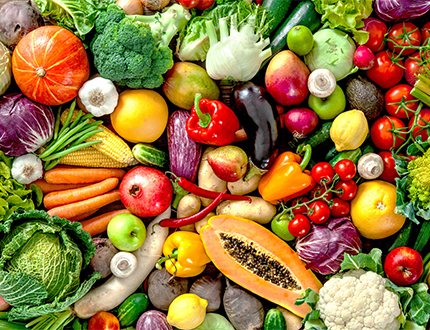The rising demand for fresh, high-quality ingredients in the restaurant industry is undeniable. Diners today are more health-conscious and discerning than ever before, making the selection of top-notch produce essential for any successful restaurant. This article delves into the must-have fresh produce items that can enhance menus and meet customer expectations, showcasing the role of fresh ingredients in creating vibrant, healthy, and delicious dishes.
Dairy
Restaurants should keep fresh dairy products in stock for several important reasons:
- Quality and Taste: Fresh dairy products enhance the quality and taste of dishes. Many recipes rely on the flavor, texture, and consistency that fresh dairy products provide. For example, fresh cream, butter, and cheese contribute to the richness and depth of flavor in both savory and sweet dishes.
- Health and Safety: Fresh dairy products are less likely to contain harmful bacteria and spoilage compared to older products. Using fresh ingredients helps ensure the safety of the food served to customers, reducing the risk of foodborne illnesses.
- Customer Satisfaction: Fresh ingredients, including dairy, are often associated with higher quality and better dining experiences. Customers are more likely to return to a restaurant that consistently serves fresh, delicious food.
- Versatility: Fresh dairy products are versatile and can be used in a wide range of dishes, from appetizers to desserts. Keeping them in stock allows restaurants to maintain a diverse menu and accommodate various customer preferences and dietary needs.
- Brand Reputation: Maintaining a reputation for using fresh ingredients, including dairy, can enhance a restaurant’s brand. Customers who value quality and freshness are likely to spread positive word-of-mouth and return for repeat visits.
- Compliance with Standards: Health and safety regulations often require restaurants to use fresh ingredients and properly manage their inventory. Keeping fresh dairy products in stock helps ensure compliance with these regulations and avoids potential fines or closures due to health code violations.
- Cost Management: While fresh dairy products may have a shorter shelf life, managing inventory effectively to ensure freshness can reduce waste. Proper stock rotation and usage can prevent the need to discard spoiled products, ultimately helping with cost management.
In summary, keeping fresh dairy products in stock is essential for ensuring high-quality dishes, maintaining health and safety standards, satisfying customers, and managing costs effectively. Visit https://www.nangwizard.net/ for more info on whipped cream canisters with a longer shelf life.
Leafy Greens
Leafy greens are a cornerstone of healthy eating and a versatile ingredient in various dishes. Varieties such as kale, spinach, arugula, romaine, and mixed greens offer high nutritional value and are rich in vitamins, minerals, and antioxidants. These greens can be used in salads, smoothies, and garnishes, making them indispensable in the kitchen.
Leafy greens provide essential nutrients like vitamins A, C, and K, as well as folate and fiber. They are low in calories but high in nutritional content, which makes them ideal for health-conscious diners. The versatility of leafy greens allows chefs to experiment with textures and flavors, enhancing a wide range of dishes.
When selecting leafy greens, look for fresh, crisp leaves without wilting or discoloration. Proper storage is crucial to maintain their freshness. Keep leafy greens in the refrigerator, ideally in a high-humidity drawer, and avoid washing them until just before use to prevent excess moisture from causing spoilage.
Tomatoes
Tomatoes are a staple in many cuisines, prized for their flavor and versatility. Whether using heirloom, cherry, Roma, or beefsteak varieties, tomatoes add depth and richness to sauces, salads, and garnishes. Tomatoes are rich in antioxidants, particularly lycopene, which has been linked to numerous health benefits. They are also a good source of vitamins C and K, potassium, and folate. Their natural sweetness and acidity make them a favorite ingredient in many recipes.
Ripe tomatoes should be firm but yield slightly to pressure, with a deep, vibrant color. Store tomatoes at room temperature to preserve their flavor; refrigerate only if they become overly ripe to prevent spoilage.
Root Vegetables
Root vegetables like carrots, beets, potatoes, sweet potatoes, and radishes are nutritional powerhouses with a long shelf life. Their hearty nature makes them suitable for a variety of culinary applications, from soups and roasts to salads and sides. Root vegetables are packed with essential nutrients, including vitamins A and C, potassium, and dietary fiber. They provide energy and nutritional density, making them perfect for creating satisfying dishes.
Choose root vegetables that are firm and free from blemishes or soft spots. Store them in a cool, dark place to extend their shelf life. Potatoes and sweet potatoes should be kept in a dry, ventilated area to prevent sprouting.
Herbs
Fresh herbs like basil, cilantro, parsley, mint, rosemary, and thyme are essential for adding flavor and aroma to dishes. They can elevate a meal from ordinary to extraordinary with their fresh, vibrant taste. Herbs are a rich source of vitamins and antioxidants. They enhance the flavor profile of dishes and offer health benefits, including anti-inflammatory and digestive properties. Fresh herbs provide a more robust flavor compared to dried herbs, making them a valuable addition to any kitchen.
Select herbs that are bright and fragrant, with no signs of wilting or discoloration. Store them in the refrigerator, ideally wrapped in a damp paper towel and placed in a plastic bag. Some herbs, like basil, are best stored at room temperature with their stems in water.
Berries
Berries such as strawberries, blueberries, raspberries, and blackberries are beloved for their natural sweetness and high antioxidant content. They are versatile and can be used in desserts, salads, and sauces. Berries are packed with vitamins, particularly vitamin C, and are high in fiber and antioxidants, which help protect the body from free radicals. Their sweet and tart flavors make them a popular ingredient in both sweet and savory dishes.
Choose berries that are plump, firm, and free from mold. Store them in the refrigerator and wash just before use to extend their shelf life. To avoid crushing, store them in a single layer in a shallow container.
Citrus Fruits
Citrus fruits, including lemons, limes, oranges, and grapefruits, are essential for adding bright, zesty flavors to dishes. They are also valued for their high vitamin C content and refreshing taste. Citrus fruits are rich in vitamins, particularly vitamin C, and contain beneficial compounds like flavonoids and fiber. They add acidity and freshness to dishes, balancing flavors and enhancing overall taste.
Select citrus fruits that are firm and heavy for their size, indicating juiciness. Store them at room temperature if using soon, or in the refrigerator to extend their shelf life.
Conclusion
Stocking up on high-quality, fresh produce is crucial for any restaurant aiming to meet the growing demand for vibrant, healthy, and delicious dishes. Leafy greens, tomatoes, root vegetables, herbs, berries, and citrus fruits each offer unique benefits and versatility, making them indispensable in a well-rounded kitchen. By prioritizing these fresh ingredients, restaurant owners and chefs can enhance their menus, delight their customers, and ensure the success of their culinary offerings.

